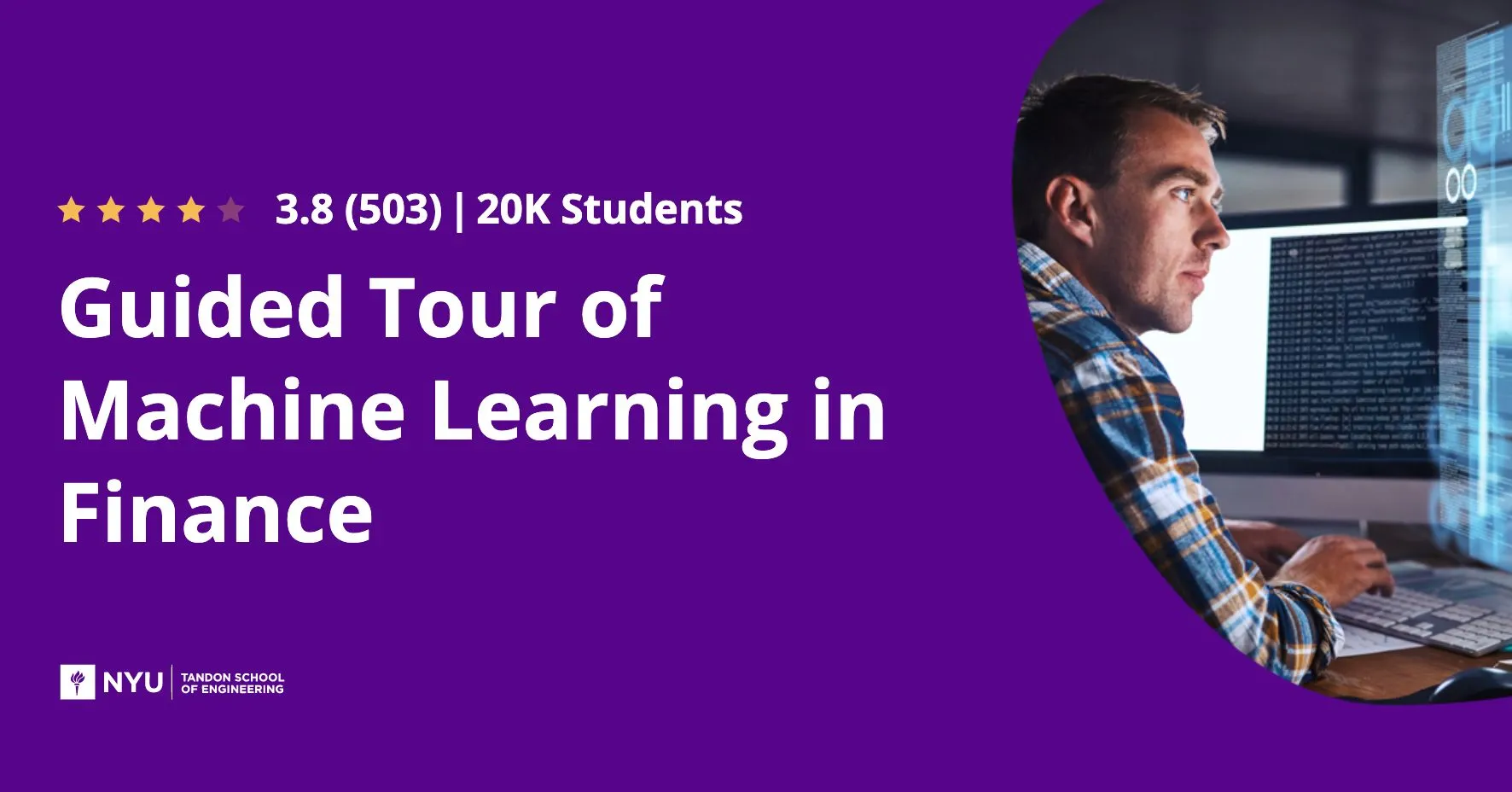
Guided Tour of Machine Learning in Finance 
This course provides an introduction to the field of Machine Learning and its applications in the field of Finance. Participants will gain an overview of the fundamentals of ML and its potential to revolutionize the financial industry. ▼
ADVERTISEMENT
Course Feature
![]() Cost:
Cost:
Free
![]() Provider:
Provider:
Coursera
![]() Certificate:
Certificate:
No Information
![]() Language:
Language:
English
![]() Start Date:
Start Date:
Self Paced
Course Overview
❗The content presented here is sourced directly from Coursera platform. For comprehensive course details, including enrollment information, simply click on the 'Go to class' link on our website.
Updated in [March 06th, 2023]
This course, Guided Tour of Machine Learning in Finance, provides an introductory and broad overview of the field of Machine Learning (ML) with a focus on applications in Finance. Students will learn about supervised Machine Learning methods and how they can be used to predict bank closures in a capstone project. Additionally, this course will provide students with an understanding of what Machine Learning is, what it is used for, and how it can be applied to various financial problems.
[Applications]
The application of this course can be seen in various financial problems. It can be used to predict bank closures, detect fraud, and analyze customer behavior. It can also be used to develop trading strategies, optimize portfolios, and forecast stock prices. Additionally, it can be used to develop automated trading systems, detect market anomalies, and develop risk management systems. Furthermore, it can be used to develop credit scoring systems, develop customer segmentation models, and develop customer retention models.
[Career Paths]
1. Financial Data Scientist: Financial Data Scientists use machine learning algorithms to analyze large datasets and develop predictive models to help financial institutions make better decisions. They are also responsible for developing and maintaining data pipelines and ensuring data accuracy. As the demand for data-driven decision making increases, the need for Financial Data Scientists is expected to grow.
2. Financial Risk Analyst: Financial Risk Analysts use machine learning algorithms to identify and assess potential risks in financial markets. They are responsible for developing risk models, analyzing financial data, and providing insights to help financial institutions make informed decisions. With the increasing complexity of financial markets, the demand for Financial Risk Analysts is expected to grow.
3. Financial Trading Algorithm Developer: Financial Trading Algorithm Developers use machine learning algorithms to develop automated trading strategies. They are responsible for designing, testing, and deploying trading algorithms that can be used to execute trades in financial markets. As the demand for automated trading increases, the need for Financial Trading Algorithm Developers is expected to grow.
4. Financial Machine Learning Engineer: Financial Machine Learning Engineers use machine learning algorithms to develop and maintain financial applications. They are responsible for designing, developing, and deploying machine learning models that can be used to automate financial processes. With the increasing demand for automation in the financial sector, the need for Financial Machine Learning Engineers is expected to grow.
[Education Paths]
1. Bachelor of Science in Financial Engineering: This degree program focuses on the application of mathematical and computational methods to the analysis of financial markets and instruments. It combines the study of economics, finance, mathematics, and computer science to develop models and algorithms for pricing, hedging, and trading financial instruments. This degree is becoming increasingly popular as the financial industry is becoming more reliant on technology and data-driven decision making.
2. Master of Science in Data Science: This degree program focuses on the application of data science techniques to solve complex problems in finance. It combines the study of mathematics, statistics, computer science, and finance to develop models and algorithms for predicting financial markets and instruments. This degree is becoming increasingly popular as the financial industry is becoming more reliant on data-driven decision making.
3. Master of Science in Artificial Intelligence: This degree program focuses on the application of artificial intelligence techniques to solve complex problems in finance. It combines the study of mathematics, statistics, computer science, and finance to develop models and algorithms for predicting financial markets and instruments. This degree is becoming increasingly popular as the financial industry is becoming more reliant on AI-driven decision making.
4. Master of Science in Financial Technology: This degree program focuses on the application of technology to solve complex problems in finance. It combines the study of mathematics, statistics, computer science, and finance to develop models and algorithms for predicting financial markets and instruments. This degree is becoming increasingly popular as the financial industry is becoming more reliant on technology-driven decision making.
Course Syllabus
Specialization Objectives
Specialization Prerequisites
Artificial Intelligence and Machine Learning
Machine Learning as a Foundation of Artificial Intelligence
Pros & Cons

Lecture material is of high quality.

Real-world applications are featured.

Course offers opportunities for problem-solving.

Poorly worded assignments.

Vague instructions.

Technical glitches with grading.
Course Provider

Provider Coursera's Stats at AZClass
Discussion and Reviews
0.0 (Based on 0 reviews)
Explore Similar Online Courses

Kali Linux: Ethical Hacking Getting Started Course

Thawing Permafrost: Science Policy and Environmental Justice in the Arctic

Python for Informatics: Exploring Information

Social Network Analysis

Introduction to Systematic Review and Meta-Analysis

The Analytics Edge

DCO042 - Python For Informatics

Causal Diagrams: Draw Your Assumptions Before Your Conclusions

Whole genome sequencing of bacterial genomes - tools and applications

How I would learn Machine Learning (if I could start over)

Learn Data Science and Machine Learning on Microsoft Azure

Machine Learning for Everyone
 Related Categories
Related Categories
 Popular Providers
Popular Providers
Quiz
 Submitted Sucessfully
Submitted Sucessfully
1. What is the goal of Guided Tour of Machine Learning in Finance?
2. What type of Machine Learning methods are used in the capstone project?
3. What is the focus of this course?


Start your review of Guided Tour of Machine Learning in Finance